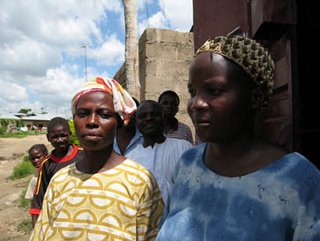More details are emerging from the crash:
Shehu also found out:
Many more people would have survived the ADC plane crash at Abuja Airport on Sunday if the emergency services had got there faster, villagers near the scene
of the crash said yesterday.
They also revealed the Sultan of Sokoto was found clutching a Holy Qur’an, prayer beads and his passport. His body was the only one that was not burned, villagers said.
Two of the young men who were working on a farm when the plane crashed said many more people were alive in the wreckage of the plane when it crashed.
Speaking to Daily Trust at Tungan Madaki, Mr. Rabiu Madaki Adamu said: “There were people alive at the time we got there. A good number of them were trapped under some of the plane parts. We saw a good number of them beckoning at us to go and help them, we regret we cold not do much because we were afraid that we may be trapped in the burning fire. We shed tears as we saw most of them burnt to death.“If the police, soldiers and the fire service had reported quicker, I am sure they would have saved very many of them. Very few corpses were seen after the crash. Majority of the people were killed by fire and thick smoke.”
Shehu also found out:
Airline sources admitted yesterday the plane was the only one in ADC’s
fleet still working. It was so “overused” flight engineers refused to
travel in it because of technical faults, sources said.
Daily Trust
yesterday reported the pilot ignored a directive from the Control Tower not to
take off due to bad weather. Senior air force sources have confirmed this. A
reliable source at the ADC airline office in Abuja told Daily Trust that the
pilot of the crashed plane, Captain Atanda Kolawole only graduated as a
qualified pilot in 2005.
The source said: “Because the management of the
airline refused to maintain the plane by doing all the necessary repairs, no
flight engineer agreed to follow the plane. By right, every passenger plane must
have a flight engineer on board to attend to all emergencies. This one had none.
“The plane was the only serviceable plane we had. Two others are currently
grounded in Lagos. The crashed plane was being over used before the accident.
The same plane will fly from Lagos to Abuja to Calabar to Lagos to Abuja again
then go to Yola for night stop in a day. It also goes on international route,
ones a week to Obudu in the West Coast. In addition to all these, it goes top
Sokoto very Friday and Sunday. You can imagine what the plane has been passing
trough.”The source also revealed the plane filled its tanks with jet fuel in
Abuja because they were not sure
they could get any in Sokoto.
he had been monitoring radio traffic on the day of the crash. He said the pilot of the crashed ADC plane was repeatedly warned by the control tower on the bad weather around the airport but he insisted on flying.
He said: “We were monitoring all the signals between the control tower and the three planes on the ground through our sets. He said when the pilot decided to taxi the plane in readiness for a take off, the control tower called him and gave him the latest weather report which was not good for a take off, but that the pilot refused to respond to the control tower.”
The air force officer also said they heard when the control tower was advising the pilot on the detail weather condition and telling him of the level he should fly and the accelerating point of the flight to tally with the wind and the rain storm since he insisted on taking off, but that the pilot refused to respond to them or even acknowledge the message.He said almost immediately, the control tower declared the plane missing. He said few minutes later an air force aircraft that landed at the airport reported that they saw smoke close to the end of the tarmac but could not ascertain its source. After a little while the village farmers reported the crash, he said.




